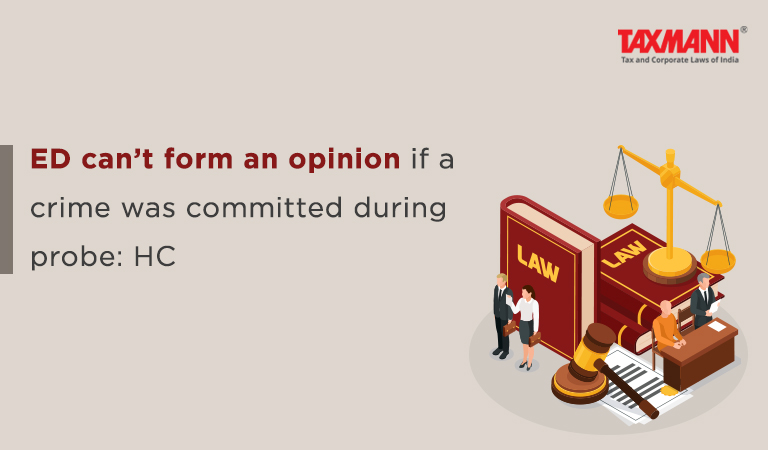ED can’t form an opinion if a crime was committed during probe: HC
- Blog|News|FEMA & Banking|
- 2 Min Read
- By Taxmann
- |
- Last Updated on 31 January, 2023

Case Details: Prakash Industries Ltd. v. Union of India - [2023] 146 taxmann.com 502 (HC-Delhi)
Judiciary and Counsel Details
-
- Yashwant Varma, J.
- Ankur Chawla, Gurpreet Singh, C.B. Bansal, Aamir Khan, Shivam Tandon & Ms Prerna Mahajan, Advs. for the Petitioner.
- Zoheb Hossain, Vivek Gurnani, Santokh Singh & Ms. Kumud Ranjan for the Respondent.
Facts of the Case
In the instant case, the question was raised before the High Court as to whether Enforcement Directorate (ED) can form an opinion from the material gathered by it that a predicate/scheduled offence has been committed and provisionally attach the properties based on that opinion?
High Court Held
The High Court observed that the Prevention of Money Laundering Act, 2002 (PMLA) empowers the ED to investigate Section 3 offences only. Its power to investigate and enquire stands confined to the offence of money laundering as defined in that Section. However, the same cannot be read as enabling it to assume from the material that it may gather in the course of that investigation that a predicate offence stands committed.
Sec 3 of PMLA read as follows –
“Whosoever directly or indirectly attempts to indulge or knowingly assists or knowingly is a party or is actually involved in any process or activity connected with the [proceeds of crime including its concealment, possession, acquisition or use and projecting or claiming] it as untainted property shall be guilty of offence of money-laundering”.
The High Court was of the view that the predicate offence has to be necessarily investigated and tried by the authorities empowered by law in that regard. The primary function is to investigate and try such offences remain and vest in authorities constituted under those independent statutes. ED cannot possibly arrogate itself with the power to investigate or enquire into the alleged commission of those offences.
The High Court, further noted that regard must be given to the fact that initiation of action w.r.t ‘attachment of property’ u/s 5 of the Act is premised on the competent authority having reason to believe that a person is in possession of proceeds of crime. Thus, the formation of opinion under the said provision is not related to the commission of a scheduled offence.
The High Court held that Section 66(2) read with Section 5 of the Act accounts for a situation where even though a report under Section 173 of the Cr.P.C. or a complaint may not have come to be registered, the ED would yet be empowered to proceed against the tainted property if it is of the opinion that in the absence of emergency measures being adopted, the objective of the Act to attach and confiscate proceeds of crime would be frustrated.
The High Court, further held that ED cannot form an opinion from the material gathered by it that a predicate offence has been committed and provisionally attach properties based on that opinion. Such power of ED cannot even be deduced from emergency powers of provisional attachment under the second proviso to section 5 of the Act.
Disclaimer: The content/information published on the website is only for general information of the user and shall not be construed as legal advice. While the Taxmann has exercised reasonable efforts to ensure the veracity of information/content published, Taxmann shall be under no liability in any manner whatsoever for incorrect information, if any.

Taxmann Publications has a dedicated in-house Research & Editorial Team. This team consists of a team of Chartered Accountants, Company Secretaries, and Lawyers. This team works under the guidance and supervision of editor-in-chief Mr Rakesh Bhargava.
The Research and Editorial Team is responsible for developing reliable and accurate content for the readers. The team follows the six-sigma approach to achieve the benchmark of zero error in its publications and research platforms. The team ensures that the following publication guidelines are thoroughly followed while developing the content:
- The statutory material is obtained only from the authorized and reliable sources
- All the latest developments in the judicial and legislative fields are covered
- Prepare the analytical write-ups on current, controversial, and important issues to help the readers to understand the concept and its implications
- Every content published by Taxmann is complete, accurate and lucid
- All evidence-based statements are supported with proper reference to Section, Circular No., Notification No. or citations
- The golden rules of grammar, style and consistency are thoroughly followed
- Font and size that’s easy to read and remain consistent across all imprint and digital publications are applied



 CA | CS | CMA
CA | CS | CMA
